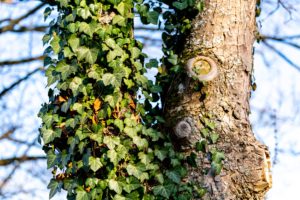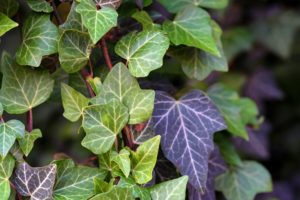What kills English Ivy, but not trees? English Ivy may be a beautiful and lush plant, but sometimes it can grow out of control and become a nuisance.
As homeowners and property managers know all too well, removing English Ivy can be a daunting task that requires brute force and patience.
Once you get your ivy under control, start working on your lawn. We can help. Check out our lawn mowing service page for more details.
But what if we told you there was an easier way? In this blog post, we’ll explore the methods for killing English Ivy without harming your beloved trees.
What is English ivy?
English ivy, known as Hedera helix, is an aggressive and fast-growing climber. It can reach 50-100 feet in length. It has small, heart-shaped dark green leaves. It grows in full sun or shade and prefers moist, well-drained soil. Once English ivy becomes established, it can take time to control. It quickly covers trees, shrubs, buildings, and just about anything else. English ivy is considered invasive in many parts of the United States.
English Ivy is also grown as a groundcover. If you have some shady spots that you have tried growing fresh sod in only to be disappointed, consider growing ivy in that spot. For other areas that just need a boost of new grass, take a look at our Bermuda sod installation page.
We also carry varieties of St. Augustine sod and Zoysia sod as well. Contact us today for more information.
Why should I get rid of English ivy?
When left unchecked, English ivy can damage the structure of your home and other buildings. The vines can grow up to 100 feet long, and the plant produces aerial rootlets that cling to surfaces.
These rootlets can work into cracks and crevices in mortar, stone, and wood, causing damage over time. English ivy also hosts several pests, including scale insects, mites, and aphids.
These pests cause problems for the plants they infest and may also spread to other nearby plants. For more information on English Ivy, read this article published by North Carolina State University titled, “English Ivy- Friend or Foe.”
Killing English Ivy Manually
When English ivy grows on trees, the first step is to manually remove as much of the vine from the tree as possible. We know it is daunting, but removing the vine from the tree is also essential.
The next step is to apply an herbicide to the remaining vines. Be sure to follow the directions given on the herbicide label. You may need to reapply the herbicide several times before all of the English ivy is killed.
Using Herbicides To Kill English Ivy
What kills English Ivy? Herbicides are the most common method to kill English ivy, as they are practical and relatively easy to use. Glyphosate-based products are usually the best option, as they destroy the ivy without harming trees or other plants. Read and follow all directions on the herbicide label before use.
To learn more reasons to avoid English Ivy in your landscape, see what the California Fish and Wildlife Department has to say in their article, “Invasive to Avoid: English Ivy.”
Will Vinegar kill English ivy?
Yes, Vinegar is effective in killing English ivy, but it largely depends on the concentration and method of application. White Vinegar with 5% acetic acid, when sprayed directly on the leaves and stems of the plant, it causes them to dry out and die.
However, this method may not be effective on large, established plants with thick stems and extensive root systems. Repeated applications may sometimes be necessary to eradicate the ivy. Remember that Vinegar can also damage or kill surrounding plants, so care should be taken when applying it.

Wrapping Up
Ensure to get a professional gardener to handle ivy overtaking your fence, trees, or walls before reaching out to Brilliant Gardeners.
An expert ivy removal service is available to assist in fixing the problem. Take the first step toward ivy removal by setting up an appointment today.
